Imogen Clark's Blog, page 11
November 19, 2021
Choosing a Setting
 For Writers….fusion-body .fusion-builder-column-7{width:33.3333333333% !important;margin-top : 0px;margin-bottom : 0px;}.fusion-builder-column-7 > .fusion-column-wrapper {padding-top : 0px !important;padding-right : 0px !important;margin-right : 3.84%;padding-bottom : 0px !important;padding-left : 0px !important;margin-left : 5.76%;}@media only screen and (max-width:1024px) {.fusion-body .fusion-builder-column-7{width:33.3333333333% !important;}.fusion-builder-column-7 > .fusion-column-wrapper {margin-right : 3.84%;margin-left : 5.76%;}}@media only screen and (max-width:640px) {.fusion-body .fusion-builder-column-7{width:100% !important;}.fusion-builder-column-7 > .fusion-column-wrapper {margin-right : 1.92%;margin-left : 1.92%;}}Choose a setting
For Writers….fusion-body .fusion-builder-column-7{width:33.3333333333% !important;margin-top : 0px;margin-bottom : 0px;}.fusion-builder-column-7 > .fusion-column-wrapper {padding-top : 0px !important;padding-right : 0px !important;margin-right : 3.84%;padding-bottom : 0px !important;padding-left : 0px !important;margin-left : 5.76%;}@media only screen and (max-width:1024px) {.fusion-body .fusion-builder-column-7{width:33.3333333333% !important;}.fusion-builder-column-7 > .fusion-column-wrapper {margin-right : 3.84%;margin-left : 5.76%;}}@media only screen and (max-width:640px) {.fusion-body .fusion-builder-column-7{width:100% !important;}.fusion-builder-column-7 > .fusion-column-wrapper {margin-right : 1.92%;margin-left : 1.92%;}}Choose a settingImagine that you’ve read a really great book but you can’t remember the title. It happens to me all the time, especially when I read digitally and have no visual memory of the cover. So, you go into a book shop and try to describe it to the bookseller…
‘It’s the one about the woman and man who fall out of love and then make up.’
Blank look.
‘You know, where he used to be a banker but dropped out to go and save the rain forests.’
Bookseller shakes head.
‘Oh, you must know the one I mean. It’s set in a lighthouse off the coast of Coast Rica.’
Bookseller scurries to shelf and finds book.
Of course, that is a ludicrous example, but it makes my point. The thing that made the book memorable to the bookseller was not the plot or the characters but the setting. This is because it’s the setting that takes a reader deep into the world of a novel, creating those vital visual images that allow them to travel with the protagonist. Whether a story is set in the heart of the Amazon jungle, a post-apocalyptic landscape, or on one street in London, the way that setting is described can make all the difference to your reader’s experience.
How about this example. A love story might be memorable, but a love story set on the French Riviera is likely to stay with your reader longer. An open top car, a silk headscarf, some over-sized sunglasses and a picnic hamper. Driving along the coast road with the Mediterranean lapping on the sand, the sultry heat of the day just starting to drop. Yachts nestling into the harbour, the constant clicking of halyards hitting the masts.
Can you picture it, feel the sun’s warmth on your skin, taste the anticipation of what is about to happen? Yes, me too!
All this detail helps your reader to drop deeper into your story, which means that they enjoy it more and will then want to seek out your other books. Result!
Obviously, descriptions like this one are kind of generic. They give your reader a feel for where the story is set so they can use their imagination and experiences to fill in the blanks, making the story richer for them.
Alternatively, you can be more specific and use an actual place. This is how I like to work. I tend to pick an actual place to set my books in for two reasons.
Firstly, if I have a visual image of somewhere in my head then it makes it much easier for me to write the descriptive passages. If I can envisage the house where my characters live then their movements both inside and around it become clearer. I never actually name the street, of course, but I know exactly where the house is and I have generally found a floor plan of the actual house or something similar online.
The second reason is that I get to go on research trips!
My first novel Postcards From A Stranger is set in my home town of Ilkley. In the first draft however, I had fixed the book in some vague town in the north of England, hoping that the reader would pick up enough of the atmosphere from my stock descriptions. I should have known better. My writing buddy had already commented that the few scenes set in San Francisco (a place I had recently visited and could describe in vibrant detail) were “just so easy to picture.” It was obvious I needed to rethink.
What wasn’t so clear was how to go about improving the sense of setting. Should I invent an entirely new town based loosely on one I already knew? Should I ground the story solidly in a place where the reader could trace my character’s steps, should they so choose? Was I aiming for a fictional place like Val McDermid’s Bradfield or a real location such as Ian Rankin’s Edinburgh? While I had experimented with both options — my books for young teenagers are set in a fictional suburb of North London — I decided that in this case, I needed the place to be real.
Picking a real setting gave me the advantage of being able to easily visualise where the action was taking place. This meant that in writing the descriptions, I had not only my memory but also photos from the internet to rely on, and if I got really stuck, I could always just wander up to town and have a look.
Once I had decided to set my novel in Ilkley, the challenge of representing local businesses and landmarks came up. The train station was easy enough — I even learned that it was the last British Rail station to be lit by gas (until 1988 apparently). Bars and coffee shops were trickier: did I use ones that are really there or invent generic ones? Should I mention them by name? Betty’s Tea Shop, for example, is well-known and features in novels by Kate Atkinson and Robert Galbraith, amongst others.
In the end, I decided to use real places with clear descriptions (so that the reader could identify them should they so choose), although I didn’t go so far as to give their actual names. I have also used the settings as part of my marketing strategy, tagging the real venue in my tweets, etc. I even had my launch party in a local bar that features in the story and read the scene that was set there to my audience. One of the coffee shops featured retweeted a description of the place taken from the novel, and they were happy to display some advertising postcards that I had printed.
But I had to remember to see my hometown through my character’s eyes and not mine.
Ilkley is a pretty place and nestles snuggly in the Wharfe Valley with moors rising up on either side. It is genteel, having been a Victorian Spa town once upon a time. There are cherry blossom trees, fairy lights, and Farrow and Ball shop fronts, and it attracts thousands of visitors every year because it makes a lovely place for a day trip.
But, this is not the side of the town that I wanted to portray in my book. In the novel, my protagonist, Cara, is trapped in Ilkley, forced to care for her terminally ill father whilst her elder brother escapes to London. The twee parts of the town — the areas that attract the tourists — mean nothing to her. Instead, she (and therefore the reader), focus on the darkly ominous moor that rises up like a shadow behind her house. The Ilkley of the book is a dank place where the sky remains resolutely grey. Back in the real world, the sun does occasionally shine in Yorkshire, and I had pangs of guilt at drawing such a bleak picture of my hometown. But I had to remember that I had to see it through Cara’s eyes, and not my own.
Of course, your story doesn’t need to be set in a real place just as long as your descriptions are consistent and evocative. Depending on what genre you write in, you may wish to invent a whole new place. I have a book, unpublished as yet, which is set on an entirely fictitious island in the Orkneys off Scotland. The island is an amalgam of other Scottish islands, but I am never going to infuriate my readers by getting something wrong because it is entirely imaginary. I did draw a map though, with roads linking the places up and I knew exactly where each character lived and in what kind of house. All great fun.
If you write in other genres, the world in which your story is set may be plucked entirely from your head. It may not even be based on Earth. The possibilities are only limited by your imagination. What is important, however, is that your reader can picture where the action is taking place in their mind’s eye.
Your settings may even become almost like a character in your book – think of the moors in Wuthering Heights or Hogwarts in Harry Potter. There are articles online about how to actually make your settings like a character with its own history, motivation and story arc. This is taking things a little bit far for me, but you can maybe see the advantage of at least having the place fleshed out enough that it helps to form the plot.
And don’t forget that the setting is not just the geography of your book. It covers the internal scenes as well and you can use the rooms your character inhabits to drop clues about who your characters are, the lives they lead, and what makes them tick. Is their home cramped or spacious? Is each surface piled high with souvenirs of their past lives or wiped clean of anything that might give something away? What kind of pictures do they hang on their walls? Are there dirty, abandoned coffee cups on the table or do they keep their dishes clean? These are the details that set the scene and tell your reader something about who they are dealing with.
So, you can see, I hope, that the more detailed you make your setting, the richer your story becomes and that is what we, as writers, are all shooting for.
Still got questions about me? Then please join me on my Imogen Clark Author Facebook page, on Instagram and Twitter. Join my Readers’ Club to keep up to date with behind the scenes of my life and work and exclusive offers. In the end, please get in touch whichever way suits you best.
.fusion-body .fusion-builder-column-8{width:66.6666666667% !important;margin-top : 0px;margin-bottom : 20px;}.fusion-builder-column-8 > .fusion-column-wrapper {padding-top : 0px !important;padding-right : 0px !important;margin-right : 2.88%;padding-bottom : 0px !important;padding-left : 0px !important;margin-left : 3.84%;}@media only screen and (max-width:1024px) {.fusion-body .fusion-builder-column-8{width:66.6666666667% !important;order : 0;}.fusion-builder-column-8 > .fusion-column-wrapper {margin-right : 2.88%;margin-left : 3.84%;}}@media only screen and (max-width:640px) {.fusion-body .fusion-builder-column-8{width:100% !important;order : 0;}.fusion-builder-column-8 > .fusion-column-wrapper {margin-right : 1.92%;margin-left : 1.92%;}}.fusion-body .fusion-flex-container.fusion-builder-row-6{ padding-top : 0px;margin-top : 0px;padding-right : 0px;padding-bottom : 0px;margin-bottom : 0px;padding-left : 0px;}
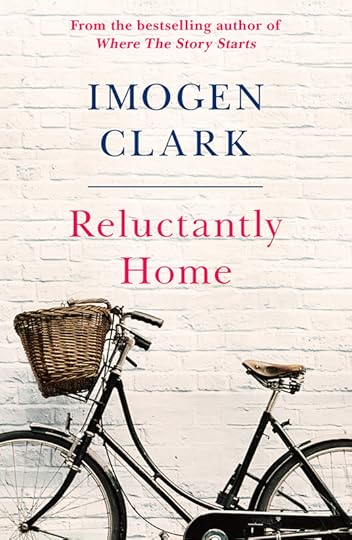




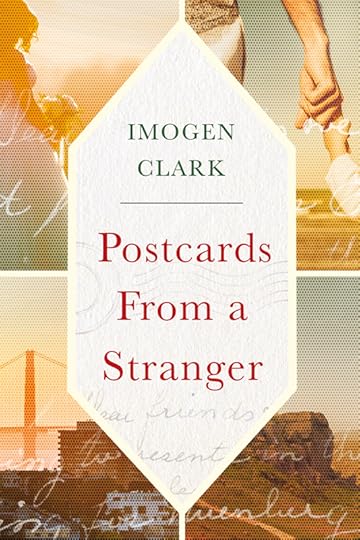 .fusion-body .fusion-builder-column-9{width:100% !important;margin-top : 10px;margin-bottom : 0px;}.fusion-builder-column-9 > .fusion-column-wrapper {padding-top : 20px !important;padding-right : 0px !important;margin-right : 1.92%;padding-bottom : 0px !important;padding-left : 0px !important;margin-left : 1.92%;}@media only screen and (max-width:1024px) {.fusion-body .fusion-builder-column-9{width:100% !important;order : 0;}.fusion-builder-column-9 > .fusion-column-wrapper {margin-right : 1.92%;margin-left : 1.92%;}}@media only screen and (max-width:640px) {.fusion-body .fusion-builder-column-9{width:100% !important;order : 0;}.fusion-builder-column-9 > .fusion-column-wrapper {margin-right : 1.92%;margin-left : 1.92%;}}.fusion-body .fusion-flex-container.fusion-builder-row-7{ padding-top : 0px;margin-top : 0px;padding-right : 50px;padding-bottom : 0px;margin-bottom : 0px;padding-left : 50px;}
.fusion-body .fusion-builder-column-9{width:100% !important;margin-top : 10px;margin-bottom : 0px;}.fusion-builder-column-9 > .fusion-column-wrapper {padding-top : 20px !important;padding-right : 0px !important;margin-right : 1.92%;padding-bottom : 0px !important;padding-left : 0px !important;margin-left : 1.92%;}@media only screen and (max-width:1024px) {.fusion-body .fusion-builder-column-9{width:100% !important;order : 0;}.fusion-builder-column-9 > .fusion-column-wrapper {margin-right : 1.92%;margin-left : 1.92%;}}@media only screen and (max-width:640px) {.fusion-body .fusion-builder-column-9{width:100% !important;order : 0;}.fusion-builder-column-9 > .fusion-column-wrapper {margin-right : 1.92%;margin-left : 1.92%;}}.fusion-body .fusion-flex-container.fusion-builder-row-7{ padding-top : 0px;margin-top : 0px;padding-right : 50px;padding-bottom : 0px;margin-bottom : 0px;padding-left : 50px;}The post Choosing a Setting appeared first on Imogen Clark.
The Mythical Idea
 For Writers….fusion-body .fusion-builder-column-0{width:33.3333333333% !important;margin-top : 0px;margin-bottom : 0px;}.fusion-builder-column-0 > .fusion-column-wrapper {padding-top : 0px !important;padding-right : 0px !important;margin-right : 3.84%;padding-bottom : 0px !important;padding-left : 0px !important;margin-left : 5.76%;}@media only screen and (max-width:1024px) {.fusion-body .fusion-builder-column-0{width:33.3333333333% !important;}.fusion-builder-column-0 > .fusion-column-wrapper {margin-right : 3.84%;margin-left : 5.76%;}}@media only screen and (max-width:640px) {.fusion-body .fusion-builder-column-0{width:100% !important;}.fusion-builder-column-0 > .fusion-column-wrapper {margin-right : 1.92%;margin-left : 1.92%;}}The Mythical Initial Idea…
For Writers….fusion-body .fusion-builder-column-0{width:33.3333333333% !important;margin-top : 0px;margin-bottom : 0px;}.fusion-builder-column-0 > .fusion-column-wrapper {padding-top : 0px !important;padding-right : 0px !important;margin-right : 3.84%;padding-bottom : 0px !important;padding-left : 0px !important;margin-left : 5.76%;}@media only screen and (max-width:1024px) {.fusion-body .fusion-builder-column-0{width:33.3333333333% !important;}.fusion-builder-column-0 > .fusion-column-wrapper {margin-right : 3.84%;margin-left : 5.76%;}}@media only screen and (max-width:640px) {.fusion-body .fusion-builder-column-0{width:100% !important;}.fusion-builder-column-0 > .fusion-column-wrapper {margin-right : 1.92%;margin-left : 1.92%;}}The Mythical Initial Idea… People are constantly asking writers where we get our ideas from. Don’t you find that? It’s like there’s a secret ideas mine somewhere that only writers can access, as if we are all given our own silver shovel and sent down to dig up a little nugget of magic which we can then shape into a fully formed novel.
Oh, that it were that simple!
Of course, it isn’t. Nor is the phenomenon of having ideas for great stories unique to writers. Everyone has ideas all the time. It’s part of being human. But the difference is that we writers get very good at recognising which ones might be the bedrock for a whole novel and which ones are just a passing fancy.
I think what people tend to forget is that having good book ideas is a bit like being able to ice skate or play the clarinet. It’s not that hard to get the hang of, but if you want to get really good at it then you need to practise.
Imagine that during the day you go about your business but that every evening you have to spend the time with someone whose sole entertainment in life is talking to you – a kind of reverse Scheherazade if you will. You can cover subjects like what you ate, who you saw, or even your personal hopes and dreams, but sooner or later these topics will become tired, and you’ll have to start casting around for something with a little more meat on its bones, something that you can weave into a tale worth listening to, maybe over several consecutive evenings. You start looking for things that would make a good story.
Sometimes this will be something that you heard in the news – a man who fights off a shark attack for example. Now, at first glance, this may not seem like the basis for a whole book. A man goes into the water for his daily swim, attracts the attention of a great white and ends up bashing it on its nose until it swims off with its tail between its non-existent legs.
This, you might have identified, is an anecdote. It has the makings of an exciting short story but it’s going to be quite hard to sustain it as a full novel. So, you might reject it as an idea. Or you could start asking questions.
Why did the man go for a swim in that particular spot? Maybe he didn’t know that it was a known shark area? Maybe he was blind and wasn’t aware of the warning signs. Was the place special to him and so the risk of a shark attack was worth the pleasure of being there? Or was he gung-ho about the risk? Maybe he wanted to appear brave to his friends. Perhaps he didn’t care whether a shark ate him – was this a complicated suicide attempt.
Now we’re starting to get somewhere. Let’s run with the idea that he didn’t care about the risk. Why might that be? Has something in his life gone terribly wrong – his business gone bust, his lover left him. What was his business? Did it fail because of something that he should have done or known? Has he let down his employees, his business partners, his father?
But when faced with the pearly white teeth of the dead-eyed shark he changes his mind. What brings him round? Does he decide that he can face the adversity, fix the business, win back the lover if only he can just get this shark off his back. Has he made another huge mistake by going into the water in first place?
And when he comes out of the water, what then? Does the global publicity that he gets allow him to earn enough money to save the business? Or maybe having had a life-threatening experience he decides that change might be just what he needs to get him out of his rut. Or maybe seeing of a great white shark might be what he needs to regain the confidence to win back his lover.
This is all very silly, but you can hopefully see how the one news item can set you off down no end of storylines.
All you have to do is ask questions.
A great example of this question asking is my first novel Postcards From a Stranger. I wrote this book when my four children were aged between sixteen and nine. They were running me ragged and I felt like I never got any time to myself. One day I decided to disappear to Paris. There is an airport fifteen minutes from my house and I spent a joyful afternoon planning out how I would go. I thought about just leaving a note for when they got home from school and pointing them towards the freezer. They could make their own tea. And it wasn’t as if I was going forever. It would just be a few days.
Of course, I didn’t go. How could I? But it got me wondering what kind of mother might leave her children and what could be so terrible in her life that she felt she had to do it. And that initial idea and the questions it made me ask became the basis of the book. Postcards From a Stranger has now sold more than a quarter of a million copies and was number one in both the UK and the Australian kindle charts. All from one little nugget of a thought.
Get into the habit of asking questions about what you hear or think and see which of those grows into something big enough to be a book. Oh, and write them down! You think you’ll remember your genius ideas because they’re so brilliant but believe me – you won’t. Next time you watch the news ask yourself a ‘what if’ question about each item and see how far you can take the story.
Still got questions about me? Then please join me on my Imogen Clark Author Facebook page, on Instagram and Twitter. Join my Readers’ Club to keep up to date with behind the scenes of my life and work and exclusive offers. In the end, please get in touch whichever way suits you best.
.fusion-body .fusion-builder-column-1{width:66.6666666667% !important;margin-top : 0px;margin-bottom : 20px;}.fusion-builder-column-1 > .fusion-column-wrapper {padding-top : 0px !important;padding-right : 0px !important;margin-right : 2.88%;padding-bottom : 0px !important;padding-left : 0px !important;margin-left : 3.84%;}@media only screen and (max-width:1024px) {.fusion-body .fusion-builder-column-1{width:66.6666666667% !important;order : 0;}.fusion-builder-column-1 > .fusion-column-wrapper {margin-right : 2.88%;margin-left : 3.84%;}}@media only screen and (max-width:640px) {.fusion-body .fusion-builder-column-1{width:100% !important;order : 0;}.fusion-builder-column-1 > .fusion-column-wrapper {margin-right : 1.92%;margin-left : 1.92%;}}.fusion-body .fusion-flex-container.fusion-builder-row-1{ padding-top : 0px;margin-top : 0px;padding-right : 0px;padding-bottom : 0px;margin-bottom : 0px;padding-left : 0px;}






 .fusion-body .fusion-builder-column-2{width:100% !important;margin-top : 10px;margin-bottom : 0px;}.fusion-builder-column-2 > .fusion-column-wrapper {padding-top : 20px !important;padding-right : 0px !important;margin-right : 1.92%;padding-bottom : 0px !important;padding-left : 0px !important;margin-left : 1.92%;}@media only screen and (max-width:1024px) {.fusion-body .fusion-builder-column-2{width:100% !important;order : 0;}.fusion-builder-column-2 > .fusion-column-wrapper {margin-right : 1.92%;margin-left : 1.92%;}}@media only screen and (max-width:640px) {.fusion-body .fusion-builder-column-2{width:100% !important;order : 0;}.fusion-builder-column-2 > .fusion-column-wrapper {margin-right : 1.92%;margin-left : 1.92%;}}.fusion-body .fusion-flex-container.fusion-builder-row-2{ padding-top : 0px;margin-top : 0px;padding-right : 50px;padding-bottom : 0px;margin-bottom : 0px;padding-left : 50px;}
.fusion-body .fusion-builder-column-2{width:100% !important;margin-top : 10px;margin-bottom : 0px;}.fusion-builder-column-2 > .fusion-column-wrapper {padding-top : 20px !important;padding-right : 0px !important;margin-right : 1.92%;padding-bottom : 0px !important;padding-left : 0px !important;margin-left : 1.92%;}@media only screen and (max-width:1024px) {.fusion-body .fusion-builder-column-2{width:100% !important;order : 0;}.fusion-builder-column-2 > .fusion-column-wrapper {margin-right : 1.92%;margin-left : 1.92%;}}@media only screen and (max-width:640px) {.fusion-body .fusion-builder-column-2{width:100% !important;order : 0;}.fusion-builder-column-2 > .fusion-column-wrapper {margin-right : 1.92%;margin-left : 1.92%;}}.fusion-body .fusion-flex-container.fusion-builder-row-2{ padding-top : 0px;margin-top : 0px;padding-right : 50px;padding-bottom : 0px;margin-bottom : 0px;padding-left : 50px;}The post The Mythical Idea appeared first on Imogen Clark.
August 31, 2021
September
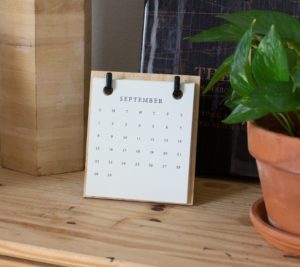
Hands up . . .
who thinks the new year starts on January 1st?
Well, yes. technically I suppose there are arguments to support that idea, but for me the new year always seems to begin a little later – in September.
September is the time for new pencil cases, fresh notebooks, and a sparklingly positive mindset and I embrace it with gusto every year. It always feels like a great time to set new goals, make new plans, write new lists and I love it. Is there anything more fun, to my mind at least, than starting something?
Of course, this feeling is a hangover from my school days and it’s curious that, even though I left formal education well over three decades ago, I should still feel the same about Septembers all these years later.
So, with the first of September comes a new sense of things beginning, of new opportunities.
And Yet . . .
September also makes me sad.
The changing of the seasons from summer to autumn is washed over with a sense of deep melancholy for me and I struggle with it every year. If there is a person who loves the summer more than I do then I’d like to meet them and shake them by the hand just so I can feel that they’re real.
I’m sure that my alter ego must be a lizard! As soon as the temperatures rise then I am at my happiest. It can rarely be too hot in England as far as I’m concerned (although I might have to change my planned activity a little) and I spend all winter longing for the days to lengthen. Even when we get those crisp cold blue-skyed days beloved of film-makers everywhere (and really quite rare in my part of Yorkshire) I’m not truly happy. I would always rather be warmed through to my bones by then sun than kicking through autumn leaves or watching snowflakes fall.
So, whilst September is exciting because I see it as the start of something new and exciting, it also marks the end of my favourite time of year and it finds me bracing myself for falling temperatures and the nights drawing in, knowing that it as well as being full of promise and expectation, the month also makes me sad.
THIS year
is stranger still because my two younger children are going away to college leaving me and my husband with an empty nest. This is yet another new beginning for me, the start of the next part of my life. It’s scary and I’m trying not to dwell on it (although of course I’m likely to blog about it once it’s happened) because it feels a bit like grieving for the quarter of a century just gone, but also it’s kind of exciting – just like September ought to be. Who knows what will happen next . . . !

The post September appeared first on Imogen Clark.
September.

HANds up . . .
who thinks the new year starts on January 1st?
Well, yes. technically I suppose there are arguments to support that idea, but for me the new year always seems to begin a little later – in September.
September is the time for new pencil cases, fresh notebooks, and a sparklingly positive mindset and I embrace it with gusto every year. It always feels like a great time to set new goals, make new plans, write new lists and I love it. Is there anything more fun, to my mind at least, than starting something?
Of course, this feeling is a hangover from my school days and it’s curious that, even though I left formal education well over three decades ago, I should still feel the same about Septembers all these years later.
So, with the first of September comes a new sense of things beginning, of new opportunities.
And Yet . . .September also makes me sad.
The changing of the seasons from summer to autumn is washed over with a sense of deep melancholy for me and I struggle with it every year. If there is a person who loves the summer more than I do then I’d like to meet them and shake them by the hand just so I can feel that they’re real.
I’m sure that my alter ego must be a lizard! As soon as the temperatures rise then I am at my happiest. It can rarely be too hot in England as far as I’m concerned (although I might have to change my planned activity a little) and I spend all winter longing for the days to lengthen. Even when we get those crisp cold blue-skyed days beloved of film-makers everywhere (and really quite rare in my part of Yorkshire) I’m not truly happy. I would always rather be warmed through to my bones by then sun than kicking through autumn leaves or watching snowflakes fall.
So, whilst September is exciting because I see it as the start of something new and exciting, it also marks the end of my favourite time of year and it finds me bracing myself for falling temperatures and the nights drawing in, knowing that it as well as being full of promise and expectation, the month also makes me sad.
THIS yearis stranger still because my two younger children are going away to college leaving me and my husband with an empty nest. This is yet another new beginning for me, the start of the next part of my life. It’s scary and I’m trying not to dwell on it (although of course I’m likely to blog about it once it’s happened) because it feels a bit like grieving for the quarter of a century just gone, but also it’s kind of exciting – just like September ought to be. Who knows what will happen next . . . !

The post September. appeared first on Imogen Clark.
May 26, 2021
Home
Home is such an evocative word, isn’t it? And I think it means something different to everyone. For those who have settled a long way from where they started, either by choice or circumstance, it can refer to a country. For others it is the place where they were raised and for many it is the house (or other dwelling) in which they live.
 Photo by Julian Hochgesang
Photo by Julian Hochgesang But what if nowhere feels like home?
This is something that I’ve thought about a lot. When I was a girl, my family went through a period when we moved house regularly because of my dad’s job. In the late 70s and early 80s, I attended five different schools in seven years. Each time we packed up and moved on, my brother and I had to resettle ourselves in the new place. I think I got quite good at it. I enjoyed having new schools, new friends and a new bedroom! It was an adventure, each fresh town like a fairground ride that I hadn’t tried out before.
Then, when I was sixteen, we made what would turn out to be the final move to the town where I still live – Ilkley in Yorkshire. (If you’re interested in Ilkley then there is a free PDF about my favourite parts of the town in the Reading Room – just sign up to my newsletter to get the password.) So, you would think Ilkley would be where I think of when someone says ‘home’. After all, apart from leaving to go to university, I’ve been here for almost forty years.
And yet it doesn’t. I still feel like I’m passing through, that I’ll be here for a bit and then I’ll move on to the next place. I don’t consider myself a Yorkshire person either. My husband is from Yorkshire, born and bred, as are my children. My parents and brother live here as do my husband’s family. I couldn’t have a closer association with a place – and yet. . .
When writers have something to say . . .they often find it working its way into a book. All my stories are about family and have homes at their centre but what if the characters don’t want to be there? What if, rather like me, they feel adrift and ungrounded?
Reluctantly Home explores this issue. In the book, we meet two characters who both felt the need to escape from the place they should call home, only to find themselves, through no fault of their own, thrust right back there again. For them, the word ‘home’ doesn’t conjure safety. They don’t see home as a happy place where they are free to live, laugh and learn, where they are loved, respected, and cared for, even though one of the characters most certainly has a loving and supportive family behind her. Rather, home is stifling, somewhere that is holding them back and preventing them from being who they want to be.
Recently I saw the Oscar and BAFTA winning film Nomadland which is, unsurprisingly, about people who choose a lifestyle that is radically different from the norm. Walking home, I discussed the film’s message with my companion and was not entirely surprised to discover how differently we had each interpreted the film.
They had seen is as a sad and quite depressing story of never being able to put roots down and needing to be constantly moving on, looking for something new. I saw it in exactly the same way, but whilst for them this lack of ties was what made the film quite downbeat, I interpreted this as a positive. The nomads chose to travel, moving on whenever things changed and never staying in one place longer than they needed to to achieve certain goals. What’s not to love about that?!
Basically, we concluded, the answer came down to what an individual is looking for to find contentment. For my companion, it was to feel safe and secure in one place. For me, it was to still feel safe and secure but not to attach that to one particular location.
What I have discovered over the years, is that it’s very hard to explain the need to keep moving to a person who doesn’t feel it. I’m not sure I have done that successfully yet . . . but I keep trying.
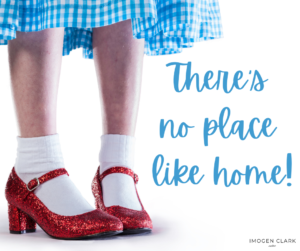
Of course, I’m not unhappy in my ‘home’. Ilkley is a delightful town in which to live and bring up children. We have a lovely house which is generally filled with music and laughter, and I’m sure all my children feel grounded and secure. It’s just that I think I will always feel like I’m just passing through . . .
Reluctantly Home is available in paperback, ebook and audiobook.
The post Home appeared first on Imogen Clark.
April 23, 2021
Something cool in The Reading Room
Hi there
You remember my Reading Room? It’s the the part of my website that you can only access if you’ve signed up to my newsletter?

Well, in there today I am giving away THREE Five Day Guest passes for MasterClass. Masterclass is the really cool site that has fantastic training courses on all kinds of interesting subjects by famous experts in their field – cooking with Gordon Ramsay, make up with Bobbi Brown, thriller writing with Dan Brown. And oodles more.
Anyway, if you’d like to win one then pop in and see what you need to do. Remember it’s first come first served as the passes only run for five more days and time is ticking.
And if you can’t get into my Reading Room then just sign up for my newsletter in the box on the right of the screen.

The post Something cool in The Reading Room appeared first on Imogen Clark.
April 4, 2021
I knew that was going to happen.
Are you one of those people who can always predict who did it in a murder mystery? Do you tend to spot the plot twists in a drama when you’ve barely set off down the track?
 Photo by Johannes Plenio on Unsplash
Photo by Johannes Plenio on UnsplashI’m not like that. In fact, I’ve always been totally hopeless at it, not spotting clues until I’ve virtually stepped in them. But I really don’t mind. When I’m reading or watching a film, I like to keep pace with the characters. I let the story build around me in real time and am generally surprised when the characters are surprised. I even stopped watching my favourite soap opera, Coronation Street, after decades of faithful viewing when the writers started to add signposts so that the audience is always ahead of the characters. That just has me shouting at the screen as I try to warn my ‘friends’ off their proposed course of action, and where’s the fun in that?
But since i’ve been writingbooks for a living, I’ve noticed that this has changed. Because I now understand the fundamentals of how a story is constructed, I can spot the building bricks. Instead of approaching the experience as a voyage of exploration as I once did, I find myself thinking in terms of story arcs and inciting incidents.
This is particularly obvious in films which never seem to rarely stray from the ‘How to Write a Story 101’ rule book. This is how it tends to go. Everything is fine. Then something happens to set the protagonist off on a particular course of action. Life gets harder and harder, often with small wins that then get snatched away only to find them in an an even worse position, until finally the protagonist cracks whatever it is and we get a satisfactory conclusion, either happy or sad depending on the film’s genre.
The trouble is, when you look at a story in those terms, broken down into its component parts like that, it loses all its magic. It stops being the adventure that we’re sharing with the characters and becomes something else.
 Photo by Almos Bechtold on Unsplash
Photo by Almos Bechtold on UnsplashOf course, there’s always a place for this kind of comfort in stories. That’s what genre is for. If you buy a romance, the cover a delight in pastels with a welcoming bubbly font, and settle down to read, then you’re going to be disappointed if the pretty, quirky, self-effacing heroine doesn’t hook up with the handsome stranger by the end.
And don’t get me wrong!I’m not knocking those books that give you exactly what it says on the tin. I read them and watch films that are exactly like that. It’s just that I quite like not knowing where I am. I have no sense of direction in real life and I suppose I must like to read and watch in the same slightly haphazard fashion, with every turn of events surprising me. So, now, when my trained eye can spot the tropes and anticipate what will happen next, some of the delicious innocence of just emerging yourself in a story and letting yourself be led along has been lost.
I have come across very few disadvantages to being an author, but for me, this is the main one. How about you? Do you pride yourself on always being two steps ahead of the characters or do you, like me, prefer to be a little bit confused?
In other news, if you’d like to hear when I have posted a blog, then you can now sign up to get a notification by email by filing in the box in the sidebar. Alternatively, if you subscribe to my newsletter then you will hear about the blog, get access to the exclusive Reading Room and get all my book news early. It’s up to you which you’d prefer.
The post I knew that was going to happen. appeared first on Imogen Clark.
March 14, 2021
Oh, the places you’ll go …
I’m going to Oxford and I am BEYOND excited about it!
It won’t be my first trip to ‘the city of dreaming spires’ as poet Matthew Arnold described it. Around a dozen years ago I went with my husband for a mooch around. We stayed in Keble College in a undergraduate room just for the full authentic experience, and had breakfast served to us in a room that wouldn’t have looked out of place in Hogwarts.

Photo by Ben Seymour on Unsplash

Photo : Keble College
For the whole of the time
we were there my heart was running wild in my chest. It’s one of those places, like Rome or New York that you’ve seen on the screen so many times you feel like you already know your way around. Four of my very, very favourite things to watch were filmed in the city – Another Country, Brideshead Revisited, Inspector Morse and more recently Lewis.
It’s interesting, perhaps, that three of these were programmes I watched when I was teetering on the cusp of adulthood. What they revealed was a world full of beauty and opportunity just waiting for me to discover for myself. Whilst I love the characters in all of them, what seemed to make an even greater impression on the young me was the environment that the characters found themselves in. How could you possibly fail to thrive in such hallowed halls? The Oxford section of Brideshead, for example, is a very small part of the whole, magnificent series, but whenever I think of Charles Ryder it is always in college with Sebastian and Aloysius.
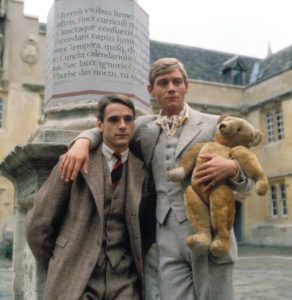
Even now
these programmes are my comfort viewing. I can quote whole sections of each, having watched them all countless times, but I never grow tired of any of them.
When we were in Oxford, my husband and I joked about running into Inspector Lewis, like you do, and then just around the very next corner we came across the film crew. Sadly, we didn’t see Messrs Whately and Fox, but just being near where the programme was being created set me all a flutter. You can see how excited I was just from looking at me!
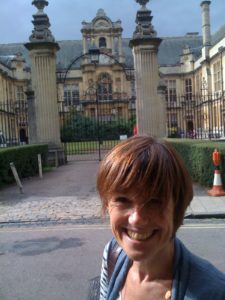
So, when it looked
like I was finally going to be released from a year of being pretty much trapped in Yorkshire, where did I find myself searching for hotels for my first post-pandemic writing trip but Oxford.
You may remember in a previous blog post, I discussed what it felt like for my creative well to run dry over lockdown. Where else to have it refilled than a city that just oozes history, literature, learning and intrigue?
Usually when I go on a research trip I have a story in mind and often I am already in the middle of writing it and so am looking for specific locations to include. But this time I have nothing like that in my head. I don’t even have the kernel of an idea of a book to set there.
I Just want to go!
In fact, I am being pulled so strongly to the place that it is beyond me to resist. I don’t know what I will find, whether it will be the start of a new project for me or just the first, long overdue step back to some sort of normality. All I do know is that my hotel is booked and I can’t wait!
My New Reading Room
In other news, the eagle-eyed amongst you might have noticed a new tab on my website. This is my new Reading Room, but access is restricted, so if you want to be one of the privileged few to get in then you’ll need to sign up to my Newsletter. (Link to your right.)
Until next time . . .
The post Oh, the places you’ll go … appeared first on Imogen Clark.
Oh, the places you’ll go . . .
I’m going to Oxford and I am BEYOND excited about it!
 Photo by Ben Seymour on Unsplash
Photo by Ben Seymour on UnsplashIt won’t be my first trip to ‘the city of dreaming spires’ as poet Matthew Arnold described it. Around a dozen years ago I went with my husband for a mooch around. We stayed in Keble College in a undergraduate room just for the full authentic experience, and had breakfast served to us in a room that wouldn’t have looked out of place in Hogwarts.
 Photo : Keble CollegeFor the whole of the time
Photo : Keble CollegeFor the whole of the timewe were there my heart was running wild in my chest. It’s one of those places, like Rome or New York that you’ve seen on the screen so many times you feel like you already know your way around. Four of my very, very favourite things to watch were filmed in the city – Another Country, Brideshead Revisited, Inspector Morse and more recently Lewis.
It’s interesting, perhaps, that three of these were programmes I watched when I was teetering on the cusp of adulthood. What they revealed was a world full of beauty and opportunity just waiting for me to discover for myself. Whilst I love the characters in all of them, what seemed to make an even greater impression on the young me was the environment that the characters found themselves in. How could you possibly fail to thrive in such hallowed halls? The Oxford section of Brideshead, for example, is a very small part of the whole, magnificent series, but whenever I think of Charles Ryder it is always in college with Sebastian and Aloysius.
 Even now
Even nowthese programmes are my comfort viewing. I can quote whole sections of each, having watched them all countless times, but I never grow tired of any of them.
When we were in Oxford, my husband and I joked about running into Inspector Lewis, like you do, and then just around the very next corner we came across the film crew. Sadly, we didn’t see Messrs Whately and Fox, but just being near where the programme was being created set me all a flutter. You can see how excited I was just from looking at me!
 So, when it looked
So, when it lookedlike I was finally going to be released from a year of being pretty much trapped in Yorkshire, where did I find myself searching for hotels for my first post-pandemic writing trip but Oxford.
You may remember in a previous blog post, I discussed what it felt like for my creative well to run dry over lockdown. Where else to have it refilled than a city that just oozes history, literature, learning and intrigue?
Usually when I go on a research trip I have a story in mind and often I am already in the middle of writing it and so am looking for specific locations to include. But this time I have nothing like that in my head. I don’t even have the kernel of an idea of a book to set there.
I Just want to go!In fact, I am being pulled so strongly to the place that it is beyond me to resist. I don’t know what I will find, whether it will be the start of a new project for me or just the first, long overdue step back to some sort of normality. All I do know is that my hotel is booked and I can’t wait!
My New Reading RoomIn other news, the eagle-eyed amongst you might have noticed a new tab on my website. This is my new Reading Room, but access is restricted, so if you want to be one of the privileged few to get in then you’ll need to sign up to my Newsletter. (Link to your right.)
Until next time . . .
The post Oh, the places you’ll go . . . appeared first on Imogen Clark.
February 22, 2021
Life as a Writer in Lockdown.
It’s Monday 22nd February 2021 and in my part of the world we have been living under some form of restriction, either local or national, since 23rd March 2020. Currently we have been in full lockdown since Christmas and it looks like there will be at least two more weeks before anything is relaxed.
Now, I’m not complaining. I am so fortunate. I have space and family and enough to eat. To that extent, my lockdown has been very easy. My struggles with it relate to my life as a writer.
 Photo by La So on UnsplashTHis is a random photo . . .
Photo by La So on UnsplashTHis is a random photo . . .chosen to reflect pre-pandemic life, a time when we were free to wander, not just around our own countries but others too. It’s a joy, obviously, to be able to explore new places, absorb the sounds around you, listen to voices that you don’t know speaking words you don’t recognise. There are colours and smells and textures that are all new. Often we absorb them as a whole, giving an impression of a new place but sometimes it is the tiny things that we notice and find the most intriguing. Why is that door there, what is behind it, who calls this street home?
The questions that your mind asks are almost endless when things are new and unfamiliar.
And this is my stock in trade. Listening, watching, questioning, wondering. This is what I do every time I leave my house and sometimes one of the questions that I ask myself will stick around and gradually build itself into an idea which, if I’m lucky, becomes big enough to turn into a book.
A couple of months into this pandemic . . .I started to get bored. I was busy enough. I was editing the book that will be released in April and writing the one after that. All four of my children were at home so I was enjoying having them here, planning meals and activities to keep everyone happy and it was one of the most beautiful Springs I can remember so I was spending a lot of time walking in the beautiful countryside around my home. There were lots of sheep photos taken!
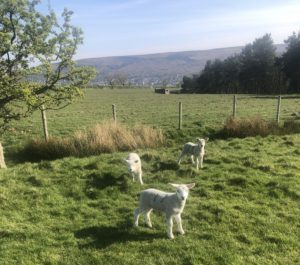
But I was bored.
I mentioned to one or two people how I was feeling and they looked at me as if there was something wrong with me. The initial fear of the pandemic had worn off and we were all being forced to stay at home in the glorious sunshine. It was like an extended holiday with everyone having time to do all those projects that they never usually got round to. If I was bored then that must surely mean that there was something wrong with me.
‘Oh, I”m never bored,’ they said smugly. ‘There’s so much to do!’
Well, I wasn’t sure short of things to do either so I pressed on.
And then finally, around month five, I worked out what it was that was wrong. I had simply chosen the wrong word to describe how I felt. I wasn’t bored. I was under-stimulated!
The artist’s wayby Julia Cameron is a book that many creatives swear by. I’ve read it and as with all books there were a couple of ideas that I took away with me. The main one is the need to fill your creative well. In the book, Cameron suggests that unless you put inspiring things into your brain you can’t expect inspiring creativity to come out of it.
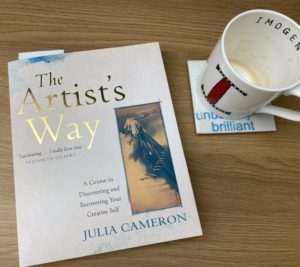
And here was my problem. Yes, I could read endlessly and watch Netflix and follow links on Twitter and explore places on Google Earth and all that has its place. But it turns out that none of it is any substitute for the real thing, for actually touching and seeing and hearing and smelling things for yourself. So, when I said that I was bored, what I really meant was that my world and my experience of it had become two dimensional and that was no long enough to stimulate my creativity.
Having finally worked this out . . .I felt a sense of relief that I wasn’t actually as dull as the smug, non-bored people had made me feel. I’ve thought about a lot since then and have decided that I need train journeys and exhibitions and new cities and conversations with people that I don’t know to allow me to question and think.
Without these things, my imagination has been ring-fenced by my own life experience and by the echo chamber that it creates. And this is not a good place for a writer.
I don’t know how much longer I will have to stay here but I am drawing up a list of all the things that I want to do when I can leave so that I can refill my depleted creative well which will hopefully then gush forth with new ideas which I can turn into stories. It’s a very long list!

So how about you? What will you do first when you can? Please let me know. I’d love to hear.
The post Life as a Writer in Lockdown. appeared first on Imogen Clark.



